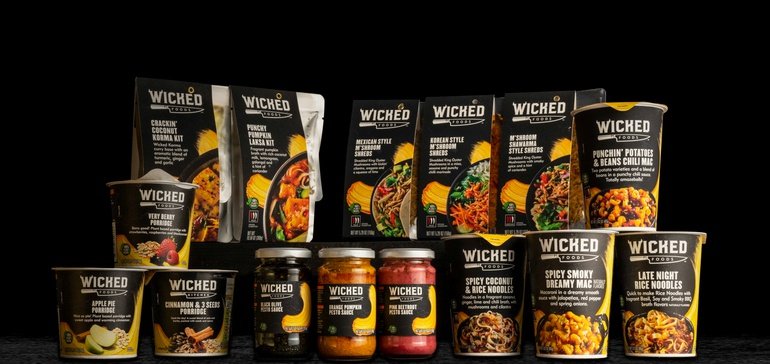Wicked Kitchen launches at 2,500 Kroger and Sprouts stores nationwide

Dive Brief:
- U.K. plant-based brand Wicked Kitchen plans a huge launch in the United States, with more than 20 SKUs debuting at all Kroger-owned banners and Sprouts Farmers Markets, the company announced. The launch brings a variety of plant-centered meals, snacks and ingredients to about 2,500 stores in the U.S.
- Wicked Kitchen, which launched as part of a partnership with U.K. supermarket Tesco in 2018, was started by Derek and Chad Sarno, who also started plant-based seafood brand Good Catch Foods. Its CEO is Pete Speranza, founder and former business development leader of General Mills’ venture capital arm 301 Inc.
- The brand closed a $14 million investment round earlier this month, and teased in the announcement that a U.S. launch was coming soon. Some of the details of this launch have been reported recently, though complete information was not provided at the time.
Dive Insight:
Wicked Kitchen was a phenomenon when its products first went on sale in about 600 Tesco stores in January 2018. The brand was the brainchild of Derek Sarno, whom the U.K. grocer had hired as its executive chef and director of plant-based innovation in 2017. Wicked Kitchen products, which had options including pizza, pastas, salads and sandwiches, were selling out from the beginning. Some analysts even credited Wicked Kitchen with helping Tesco succeed through inflationary pressures in 2018 fueled by the U.K.’s impending departure from the European Union.
Since then, Wicked Kitchen has significantly added to its portfolio, with more than 160 SKUs across Tesco stores in the U.K., and more than $20 million in sales, according to Food Navigator. And its product portfolio demonstrates a wide range of options — including veggie-forward plant-based offerings that are not trying to mimic meats, dairy or egg products. Products that will be for sale in the U.S., according to Wicked Kitchen’s website, include a line of porridge cups; meal centerpieces including mushroom-based meat-like offerings and Indian dishes; instant noodle cups that are either Asian dishes or macaroni and cheese-based; frozen tofu-based or Beyond Meat-based meals; and plant-based meat, sauces and marinades.
“As was demonstrated by Tesco, the U.K.’s largest supermarket chain, the breadth of offerings Wicked Kitchen brings to market allows motivated regional retail partners to commit to multi cross-category adoption,” Speranza said in the press release announcing the $14 million funding round. “What Wicked brings into the U.S. will be unlike anything else that has come before it in the plant-based space.”
Wicked Kitchen is the most recent international plant-based brand to jump into the United States market, which has been a successful move for some. Swedish oat milk maker Oatly, which came to the U.S. in 2017, reported $421 million sales worldwide last year — with $100 million in the U.S. — before it went public on the Nasdaq in May. At the beginning of 2021, Chile’s NotCo started selling its artificial intelligence-designed NotMilk in the U.S., and the company just closed a massive $235 million funding round to secure further expansion. Brazilian plant-based meat maker Future Farm is working on a U.S. launch now. Singapore-based Next Gen Foods, which closed a $20 million funding round earlier this month, is using that money to bring Tindle, its plant-based chicken brand, across the Pacific ocean.
Wicked Kitchen also brings with it people at the top who are familiar in this space. Derek and Chad Sarno are two of the most prominent players with plant-based foods among CPG companies, restaurants and grocery stores. Good Catch Foods features their picture on product packages. The brothers also worked with Whole Foods Market, developing plant-based recipes and promoting plant-based brands. Speranza, who came to Wicked Foods in November, spent nearly a quarter century at General Mills.
Having Kroger as a retail partner also bolsters Wicked Kitchen’s chances of U.S. success. Since Kroger is the nation’s largest grocery chain by revenue, the partnership is comparable to that between Wicked Kitchen and Tesco in the U.K. Kroger also has been working to broaden and improve its selection for its shoppers, recently expanding its partnership with indoor grower 80 Acres Farms and launching a competitive accelerator program to bring new suppliers to the grocer’s fresh section.
Source: fooddive.com

